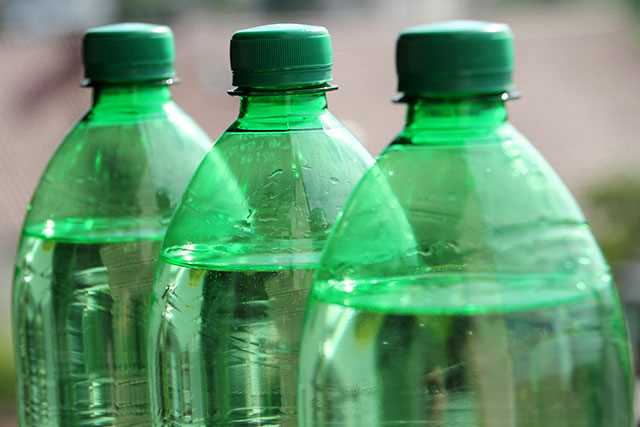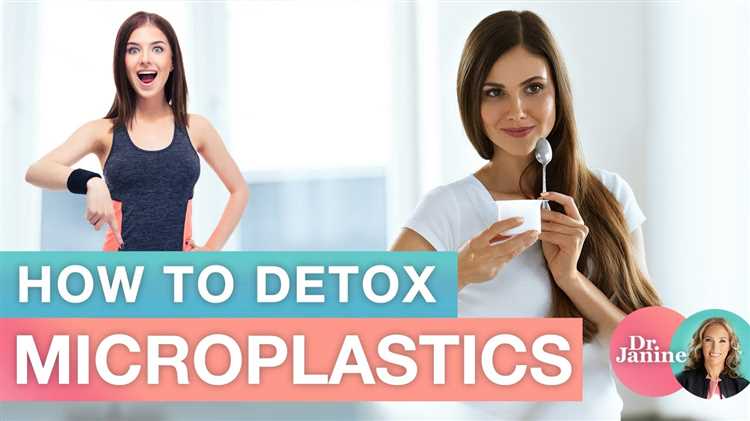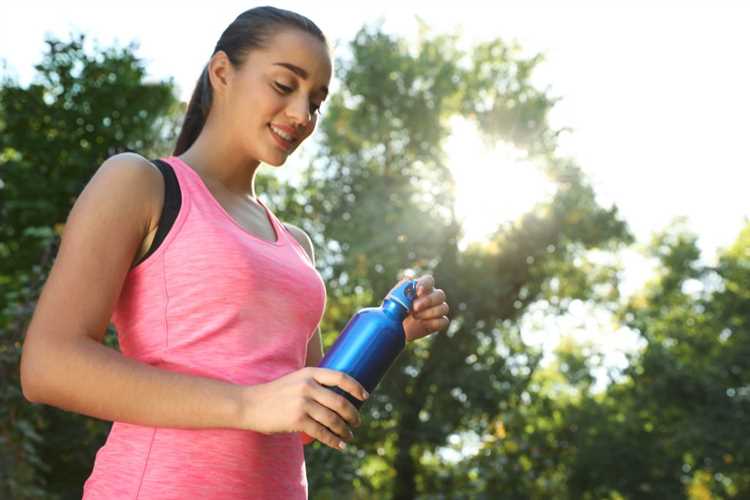
Plastic has become an integral part of our daily lives, but its increasing presence in our environment is a growing concern. From food packaging to household items, plastic is everywhere. Unfortunately, this means that we are also ingesting plastic particles without even realizing it. These tiny particles, known as microplastics, can accumulate in our bodies over time and have been linked to a range of health issues.
If you’re looking to minimize your plastic intake and detoxify your body, there are several effective methods and tips you can follow. First and foremost, reducing your use of single-use plastics is crucial. Opt for reusable alternatives such as glass or stainless steel containers, cloth bags, and metal straws. By doing so, you’ll not only reduce your exposure to harmful plastic chemicals but also contribute to a greener and more sustainable planet.
In addition to reducing your plastic consumption, there are certain dietary changes you can make to help eliminate plastic from your body. Consuming a diet rich in antioxidants, such as fruits and vegetables, can boost your body’s natural detoxification processes. Antioxidants help neutralize harmful free radicals in your body, including those caused by plastic toxins. Additionally, increasing your fiber intake can promote regular bowel movements, which can aid in the elimination of toxins and waste products, including microplastics.
It’s also important to stay hydrated and prioritize drinking filtered or purified water. Plastic water bottles and even tap water can contain microplastics. Investing in a high-quality water filtration system can help remove these particles, ensuring that you’re consuming cleaner water. Additionally, staying hydrated can help support overall detoxification processes in your body.
Finally, taking steps to minimize your exposure to plastic in your immediate environment is crucial. Avoid microwaving food or drinks in plastic containers, as heat can cause plastic chemicals to leach into your food. Use glass, ceramic, or stainless steel containers for heating and storing food. Additionally, choose natural fiber clothing and bedding over synthetic materials, as these can shed microplastic fibers when washed.
By following these effective methods and tips, you can reduce your plastic intake and help detoxify your body. Remember, every small change counts, and by making conscious choices, you can contribute to a healthier environment and a healthier you.
- Why Plastic Detox is Important for Your Health
- 1. Chemical Exposure
- 2. Accumulation in the Body
- The Harmful Effects of Plastic on Your Body
- 1. Endocrine Disruption
- 2. Cancer Risk
- 3. Respiratory Issues
- 4. Allergies and Skin Disorders
- 5. Disruption of Gut Microbiome
- Understanding the Process of Plastic Detoxification
- How Plastics Enter the Body
- The Impact of Plastic Accumulation
- Effective Methods to Detox Plastic from Your Body
- 1. Reduce Plastic Exposure
- 2. Eat Fresh and Organic Foods
- 3. Drink Filtered Water
- 4. Avoid Microwaving Plastic
- 5. Detox with Natural Supplements
- 6. Sweat it Out
- 7. Practice Proper Hygiene
- 8. Support Your Liver
- Tips for a Successful Plastic Detox
- 1. Minimize Plastic Usage
- 2. Choose Plastic-Free Food Storage
- 3. Avoid Microwaving or Heating Plastics
- 4. Filter Your Water
- 5. Eat Organic, Whole Foods
- Q&A:
- What are some effective methods to detox plastic from your body?
- Is it possible for the body to naturally detox plastic?
- Can drinking water help detox plastic from the body?
- Why is it important to avoid plastic containers and packaging?
- Are there any specific foods that can help detox plastic from the body?
- What are the health risks associated with plastic detoxification?
Why Plastic Detox is Important for Your Health
Plastic has become an integral part of our modern lives. From food packaging to household items, plastic surrounds us. However, studies have shown that exposure to plastic and its components can have serious negative effects on our health. This is why plastic detox is crucial for maintaining a healthy lifestyle.
1. Chemical Exposure
Plastic contains various chemicals, such as bisphenols and phthalates, that can leach into our food and water. These chemicals are known as endocrine disruptors, meaning they can interfere with the normal functioning of our hormones. This disruption can lead to a wide range of health issues, including reproductive problems, developmental delays in children, and increased risk of certain cancers.
2. Accumulation in the Body
Plastic particles can accumulate in our bodies over time. Microplastics, which are tiny plastic particles less than 5mm in size, have been found in various tissues and organs, including the liver, kidneys, and lungs. This accumulation can cause inflammation and oxidative stress, which are underlying factors for many chronic diseases, such as cardiovascular disease and neurodegenerative disorders.
Moreover, plastic particles can act as carriers for other toxic chemicals, such as heavy metals and persistent organic pollutants, which can further contribute to health problems.
By undergoing a plastic detox, we can reduce the levels of plastic and its associated toxins in our bodies, allowing our organs to function optimally and decreasing the risk of chronic diseases.
There are several effective methods and tips for detoxing plastic from your body. These include reducing your use of plastic products, choosing plastic-free alternatives, and consuming a healthy diet rich in antioxidants and nutrients that support detoxification processes.
In conclusion, plastic detox is essential for protecting and improving our health. By minimizing our exposure to plastic and taking proactive steps to remove it from our bodies, we can reduce the risk of various health issues and lead a healthier, more sustainable lifestyle.
The Harmful Effects of Plastic on Your Body
Plastic has become an integral part of our daily lives, but its widespread use also comes with harmful effects on our bodies. The chemicals found in plastic can leach into our food, water, and air, and can be absorbed by our bodies, leading to a range of health issues.
1. Endocrine Disruption
Plastic contains endocrine-disrupting chemicals (EDCs) such as bisphenol A (BPA) and phthalates. These chemicals can mimic or interfere with hormones in the body, disrupting the normal functioning of the endocrine system. This can lead to adverse effects on reproductive health, development, and metabolism.
2. Cancer Risk
Some plastics, such as polyvinyl chloride (PVC), contain carcinogenic substances like vinyl chloride. When plastic products are heated or come into contact with hot liquids, these chemicals can be released and ingested. Long-term exposure to such carcinogens increases the risk of developing certain types of cancer, including liver, breast, and lung cancer.
3. Respiratory Issues
Plastic pollution contributes to air pollution, and inhaling plastic particles can lead to respiratory problems. When plastic waste is burned, it releases toxic fumes that can irritate the lungs and cause asthma, bronchitis, and other respiratory conditions.
4. Allergies and Skin Disorders
Some individuals may develop allergies or skin disorders as a result of contact with certain types of plastic. Plastic additives such as rubber accelerators and dyes can cause allergic reactions or skin irritation. For individuals with sensitive skin, minimizing plastic contact can help reduce the risk of developing these issues.
5. Disruption of Gut Microbiome
Recent studies have shown that plastic particles can accumulate in the gut, leading to a disruption of the gut microbiome. This imbalance in gut bacteria can have negative effects on digestion, nutrient absorption, and overall immune function. Maintaining a healthy gut microbiome is essential for overall well-being.
| Harmful Effects of Plastic on Your Body: | ||||
|---|---|---|---|---|
| Endocrine Disruption | Cancer Risk | Respiratory Issues | Allergies and Skin Disorders | Disruption of Gut Microbiome |
Understanding the Process of Plastic Detoxification

Plastic detoxification refers to the process of removing and eliminating toxic chemicals and substances derived from plastic materials that have accumulated in the body over time. Plastics contain various harmful chemicals, such as phthalates, bisphenol A (BPA), and polybrominated diphenyl ethers (PBDEs). These chemicals can leach out of the plastic products and enter our bodies through ingestion, inhalation, and skin contact.
How Plastics Enter the Body
Plastics can enter the body through a variety of ways:
- Ingestion: Consuming food and beverages that have been stored or heated in plastic containers or wrapped in plastic packaging can lead to the ingestion of plastic particles.
- Inhalation: Breathing in plastic particles and volatile organic compounds (VOCs) released from plastic products, such as toys, furniture, and electronics.
- Skin Contact: Chemicals present in plastics can also be absorbed through the skin when coming into contact with plastic materials, such as vinyl shower curtains or plastic gloves.
The Impact of Plastic Accumulation
Plastic accumulation in the body can have various detrimental effects on our health:
| Effect | Description |
|---|---|
| Endocrine Disruption | Chemicals like BPA and phthalates can disrupt the endocrine system, leading to hormonal imbalances and adverse reproductive effects. |
| Inflammation | Plastic particles can trigger inflammation in the body, which is linked to chronic conditions such as obesity, diabetes, and cardiovascular diseases. |
| Genotoxicity | Some plastic chemicals have genotoxic properties, meaning they can damage DNA and potentially increase the risk of cancer and genetic mutations. |
It is crucial to detoxify the body from these toxic plastic substances to reduce the risk of long-term health complications.
Effective Methods to Detox Plastic from Your Body
Detoxifying plastic from your body is essential for maintaining your overall health and well-being. Plastic toxins can accumulate in your body over time and lead to various health issues. Here are some effective methods to help you detox plastic from your body.
1. Reduce Plastic Exposure
The first step to detoxing plastic from your body is to minimize your exposure to plastic. Avoid using plastic containers, bottles, and utensils, especially those made with harmful chemicals like BPA and phthalates. Choose glass, stainless steel, or BPA-free alternatives instead.
2. Eat Fresh and Organic Foods
Eating fresh and organic foods can help minimize your exposure to plastic toxins. Many packaged and processed foods come in plastic containers, which can leach harmful chemicals into the food. Opt for fresh fruits, vegetables, and whole grains instead.
3. Drink Filtered Water
Plastic water bottles can contaminate the water with harmful chemicals. Invest in a good quality water filter to remove any plastic toxins from your drinking water. Make sure to drink plenty of filtered water to flush out toxins from your body.
4. Avoid Microwaving Plastic
Heating plastic containers or using plastic wrap in the microwave can cause plastic toxins to leach into your food. Instead, use microwave-safe glass or ceramic containers to heat your food.
5. Detox with Natural Supplements

Certain natural supplements can help support your body’s detoxification process. Some examples include chlorella, spirulina, activated charcoal, and milk thistle. However, it is essential to consult with a healthcare professional before starting any new supplements.
6. Sweat it Out
Sweating can also help eliminate toxins from your body, including plastic toxins. Engage in regular physical activities or use saunas to induce sweating and promote detoxification.
7. Practice Proper Hygiene
To minimize your exposure to plastic toxins, choose personal care and hygiene products that come in glass or metal packaging instead of plastic. Look for natural and organic options that do not contain harmful chemicals.
8. Support Your Liver
Your liver plays a vital role in detoxifying your body. Support its function by consuming foods that are good for liver health, such as cruciferous vegetables, turmeric, green tea, and lemon water. Additionally, avoid excessive alcohol consumption and limit your exposure to environmental toxins.
By following these effective methods, you can gradually detox plastic from your body and reduce the risk of potential health issues associated with plastic toxins.
Tips for a Successful Plastic Detox
Detoxifying your body from plastic can be a challenging and overwhelming process. However, with the right mindset and strategies, you can successfully eliminate harmful plastic toxins from your system. Here are some tips to help you on your plastic detox journey:
1. Minimize Plastic Usage
One of the first steps to detoxing your body from plastic is to minimize your overall plastic usage. Avoid single-use plastics such as plastic bags, straws, and water bottles. Opt for reusable alternatives made from glass, stainless steel, or bamboo whenever possible.
2. Choose Plastic-Free Food Storage
Many plastics used for food storage contain harmful chemicals that can leach into your food. Switch to glass or stainless steel containers for storing leftovers or packing lunches. Look for plastic-free options when purchasing food, such as buying fresh produce instead of pre-packaged items.
3. Avoid Microwaving or Heating Plastics
Heating plastics can cause them to release toxic chemicals into your food or beverages. Avoid microwaving food in plastic containers or using plastic wrap to cover dishes when heating them. Opt for microwave-safe glass or ceramic containers instead.
4. Filter Your Water
Plastic bottles and pipes can contaminate your drinking water with harmful chemicals. Invest in a water filter for your home or use a filtered water pitcher. This will help remove plastic particles and other pollutants, ensuring you consume cleaner and healthier water.
5. Eat Organic, Whole Foods
Processed and packaged foods often contain plastic additives and chemicals. To reduce your exposure to these toxins, choose organic, whole foods whenever possible. Fresh fruits, vegetables, and grains that are minimally processed will significantly decrease your plastic intake.
By implementing these tips into your daily life, you can minimize your plastic exposure and support your body’s natural detoxification processes. Remember, small changes can make a big difference when it comes to reducing plastic in your body.
Q&A:
What are some effective methods to detox plastic from your body?
Some effective methods to detox plastic from your body include drinking plenty of water, eating a healthy and balanced diet high in fiber, exercising regularly, and avoiding plastic containers and packaging.
Is it possible for the body to naturally detox plastic?
Yes, the body has natural detoxification processes that can help eliminate some plastic molecules. However, due to the large amount of plastic present in our environment, it may be necessary to take additional steps to support the body’s detoxification process.
Can drinking water help detox plastic from the body?
Yes, drinking plenty of water can help flush out toxins from the body, including some plastic molecules. Staying hydrated is important for overall health and can support the body’s natural detoxification processes.
Why is it important to avoid plastic containers and packaging?
Plastic containers and packaging can leach harmful chemicals into food and drinks, which can then be ingested and absorbed by the body. By avoiding plastic containers and packaging, you can reduce your exposure to these chemicals and support overall health.
Are there any specific foods that can help detox plastic from the body?
Foods that are high in fiber, such as fruits, vegetables, whole grains, and legumes, can help support the body’s natural detoxification processes and eliminate some plastic molecules. It is also important to eat a variety of nutrient-rich foods to support overall health.
What are the health risks associated with plastic detoxification?
Plastic detoxification is important because plastic chemicals can have various health risks. These risks include hormonal imbalances, reproductive problems, certain cancers, and developmental issues in children.